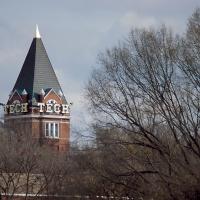In an article published this week in Nature Human Behaviour, computational science and engineering Assistant Professor Srijan Kumar and his colleagues describe why new behavioral science interventions are needed to tackle AI-generated disinformation.Generative artificial intelligence (AI) tools have made it easy to create realistic…
A Georgia Tech researcher has successfully evaded security measures on Apple’s latest MacBook Pro with the M3 processor chip to capture his fictional target’s Facebook password and second-factor authentication text. By the end of his demonstration video, Ph.D. student Jason Kim showed how the recently discovered iLeakage side-channel…
Imagine a household that consumes 1,000 kilowatt hours of energy per month. Then they install solar panels on their roof that generate 500 kilowatt hours of electricity per month on average. How much should their consumption of electricity drawn from the power grid decline after they install solar? Five hundred kilowatt hours is the expectation,…
Three out of four of the world’s most popular websites are failing to meet minimum requirement standards and allowing tens of millions of users to create weak passwords. The findings are part of a new Georgia Tech cybersecurity study that examines the current state of password policies across the internet.Using a first-of-its-kind automated tool…
The Institute for Electronics and Nanotechnology (IEN) and the Institute for Materials (IMat) have announced they will combine to form a new Interdisciplinary Research Institute (IRI) set to begin operations on July 1, 2024.The new IRI, which has yet to be named, will explore the vast scientific, technological, societal, and economic impacts of…
Georgia Tech scientists will soon have another way to search for neutrinos, those hard-to-detect, high-energy particles speeding through the cosmos that hold clues to massive particle accelerators in the universe — if researchers can find them. “The detection of a neutrino source or even a single neutrino at the highest energies is like…
Workforce diversity is imperative for innovative science and technology. Yet due to funding inequities, research infrastructure isn’t as robust at Minority Serving Institutions (MSIs), making building a diverse workforce pipeline and inclusive research collaborations challenging. With its Research Collaboration Initiative (RCI), the Georgia…
The advent of whole genome sequencing technology has prompted an explosion in research into how genetics are associated with disease risk. But the vast majority of genetics research has been done on people of European ancestry, and genetics researchers have realized that in order to address health disparities, more needs to be done.In a new study…
Open access to research data and information will be key to spur the next wave of solutions to the world’s most complex problems. With that in mind, the National Science Foundation (NSF) is creating the first-ever prototype open knowledge network.Known as Proto-OKN, it will be a free, publicly available, searchable database containing troves of…
Projects address basic research challenges facing the Energy Earthshots Initiative to mitigate climate change and reach a net-zero carbon economy.Georgia Tech faculty and researchers are involved in five university-led projects and two new Energy Earthshot Research Centers that are part of a $264 million grant from the U.S. Department of…














